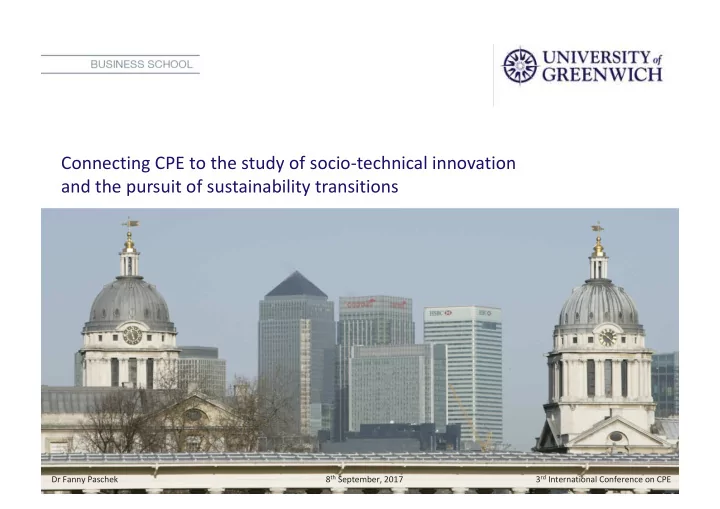

Connecting CPE to the study of socio-technical innovation and the pursuit of sustainability transitions 8 th September, 2017 3 rd International Conference on CPE Dr Fanny Paschek
Introduction & research background http://www.eureka-smart-cities.org/ Socio-technical innovation & transitions https://dy11meu7nx0jo.cloudfront.net/wp-content/uploads/Supporting- transport-innovation-through-future-research-programmes-410x246.jpg http://www.low-carbonscotland.scot/wp- content/uploads/2015/03/Smart-Mobility-Picture-2016.png Source: Geels, 2011
Multi-level perspective on transitions Source: Geels and Schot, 2010, p.25
Theoretical foundations of multi-level perspective Recreated from Geels and Schot, 2010, p.53
A CPE informed multi-level perspective (I) Adapted from Geels and Schot, 2010, p. 53
A CPE informed multi-level perspective (II) Based on Geels and Schot, 2010, p.25, and Jessop, 2013, p.238
Empirical research à Problem: What is obstructing/facilitating it becoming reality? à Key: Investigate selectivities as to how they (interact to) strategically privilege some actions & actors over others à Result: Insight into factors perpetuating existing regimes in London road transport sector transport or obstructing diffusion of niche transport modes & practices
Research design & methodology
Analysis Analysis I: Analysis II: SRA-enabled critique of relative dominance of motorised Reconstructs multi-level perspective on cycling in road transport regime over non-motorised modes, London specifically cycling
Findings (i) 1. Analysis I Multi-level perspective on changes in London’s road transport sector – Historical trends in cycling policy-making and practice à transition in progress – Cycling strategies à cycling remains constructed as subservient mode à Cycling as technical fix? – Future transition pathway à Conservative reconfiguration vs radical transformation? à Analysis II: Focus on examining barriers/opportunities for radical transformation that challenges dominance of motorised road transport regime
Findings (ii) 1. Analysis I Multi-level perspective on changes in London’s road transport sector – Historical trends in cycling policy-making and practice à transition in progress – Cycling strategies à cycling remains constructed as subservient mode à Cycling as technical fix? – Future transition pathway à Conservative reconfiguration vs radical transformation? à Analysis II: Focus on examining barriers/opportunities for radical transformation that challenges dominance of motorised road transport regime
Findings (iii) 2. Analysis II Critique of socio-technical domination in London’s road transport sector – Identifies selectivities that perpetuate regime, such as: • Formal transport governance arrangements and electoral democracy as imposing structural selectivities • Dominant imaginary of increasing levels of transport and mobility as imposing discursive selectivity • Cost-benefit analysis as imposing a disciplinary-technological selectivity – Corresponding cycling advocates’ responses (agential selectivities) as instances in which niche advocates act strategically to exploit, circumvent or subvert selectivities and challenge dominant regime, e.g.: • Cycling strategies as self-binding / pre-commitment mechanisms • ‘Love London – Go Dutch’ & ‘Space 4 Cycling’ campaigns • Role of lobby groups for cyclists with impaired mobility, particularly disabled cyclists • Creative cost-benefit accounting, e.g. NHS costs savings arising from fitter more active population, reduced workplace absenteeism, etc.
Contributions i. Establishes link between CPE and socio-technical innovation literatures and introduces SRA to a broader audience à Further theoretical grounding of transition research via MLP à Serves to extend MLP’s analytical usefulness for the study of ongoing transitions towards more sustainable futures ii. Potentially useful tool for strategic context analysis by stakeholders of ongoing, contested transition processes iii. Entry point for an explicitly critical, emancipatory transition studies from its previous normatively naïve, managerial origins
Conclusion Empirical case of London cycling: Unclear transition pathway à radical i. transformation or and emancipatory transition pathway? • Exploiting (as opposed to circumventing or subverting) selectivities of motorised road regime may act to perpetuate it • May also prove more effective way of challenging/ hollowing out/ supplanting motorised road regime from ‘within’ ii. Theoretical development: Valuable crossover for transition scholarship as connects seemingly mundane socio-technical innovation issues to broader political economic “landscape” factors • Everyday socio-technical regimes develop, survive and thrive not due to objective superior functionality • Rather they speak to (and ultimately co-evolve with) the rationalities of broader political-economic regimes which play significant role in set the parameters for what is deemed ‘functional’
Thank you! Any questions, feel free to contact: Fanny Paschek University of Greenwich Faculty of Business, Department of Systems Management & Strategy Old Royal Naval College, Park Row London SE10 9LS Email: fanny.paschek@greenwich.ac.uk Phone: 020 8331 7547
References Geels, F.W., and Schot, J., 2010. The dynamics of transitions: a socio-technical perspective. In: Grin, J., Rotmans, J., Schot, J., Geels, F.W., Loorbach, D. (eds.), Transitions to Sustainable Development: New Directions in the Study of Long Term Transformative Change. Abingdon, UK: Routledge, pp. 9–87. Geels, F.W., and Schot, J., 2007. Typology of socio-technical transition pathways. Research Policy , 36 (2007), pp. 399-417. Sum, N.-L., and Jessop, B., 2013. Towards a Cultural Political Economy: Putting Culture in its Place in Political Economy . Cheltenham, UK: Edward Elgar Publishing Limited.
Recommend
More recommend